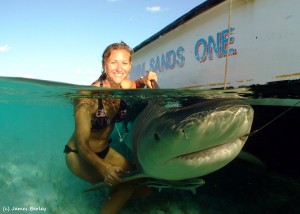 Kristine Stump is a PhD candidate in Marine Biology and Fisheries at the University of Miami’s Rosenstiel School of Marine and Atmospheric Science (RSMAS). Her dissertation focuses on the effects of anthropogenic nursery habitat loss on juvenile lemon sharks in Bimini, Bahamas. She was the Principal Investigator of the Bimini Biological Field Station (BBFS, or Sharklab) from 2008 – 2011 while collecting field data for her degree and has been heavily involved in the process of establishing a Marine Protected Area in Bimini. Kristine has an M.A. in Marine Policy from RSMAS, and prior to entering the doctoral program, she spent five years working in Washington, DC at Ocean.US – the National Office for Integrated and Sustained Ocean Observations (now the NOAA IOOS Program). In addition, she has worked for the Census of Marine Life program office at the Consortium for Ocean Leadership in Washington, DC.
Kristine Stump is a PhD candidate in Marine Biology and Fisheries at the University of Miami’s Rosenstiel School of Marine and Atmospheric Science (RSMAS). Her dissertation focuses on the effects of anthropogenic nursery habitat loss on juvenile lemon sharks in Bimini, Bahamas. She was the Principal Investigator of the Bimini Biological Field Station (BBFS, or Sharklab) from 2008 – 2011 while collecting field data for her degree and has been heavily involved in the process of establishing a Marine Protected Area in Bimini. Kristine has an M.A. in Marine Policy from RSMAS, and prior to entering the doctoral program, she spent five years working in Washington, DC at Ocean.US – the National Office for Integrated and Sustained Ocean Observations (now the NOAA IOOS Program). In addition, she has worked for the Census of Marine Life program office at the Consortium for Ocean Leadership in Washington, DC.
There is an apex predator roaming the seas. For hundreds of thousands of years, this beast has hunted in the waters of the world’s oceans. Relentless is it in its search along the shorelines for that which satisfies its primal urges. Its numbers ever on the rise, the destruction in its path knows no bounds. And now, in 2012, it wants to dominate the sea more than ever before: it wants glass-bottom bungalows. It needs yacht dockage at its vacation home. It craves manicured fairways. IT MUST HAVE AN INFINITY POOL!
If you haven’t already guessed, the apex predator here is man. Throughout history, the environment has shaped man, but now more than ever, man is shaping the environment. In the current era of environmental awareness, however, we have learned that there are limits to the anthropogenic changes ecosystems can withstand while still maintaining ecosystem function. Luckily, we have learned to implement mitigation strategies to offset, to some degree, the negative effects of human expansion.
Read More “Saving Bimini: A campaign to protect a Bahamian gem” »